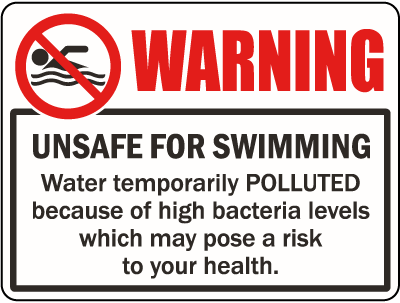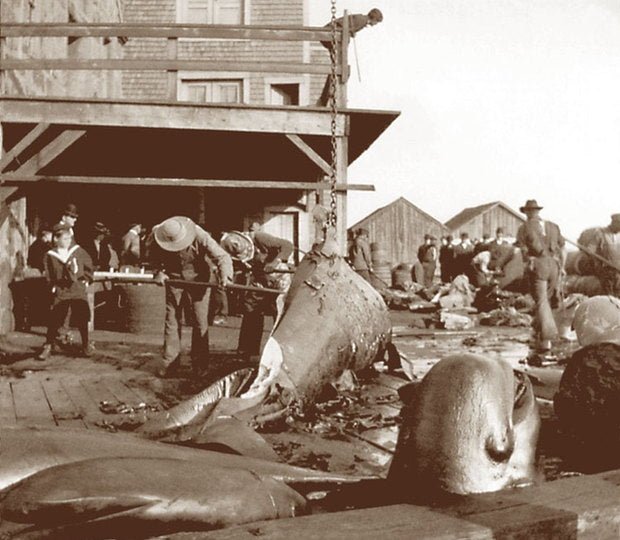
No Swimming Allowed: Urban Runoff, Contamination, & Bioaccumulation
Last week in San Diego we had our first rain in 140 days. The first storm dropped a record setting .44 inches in Oceanside, just up the coast from downtown San Diego. When I was surfing and paddling a day before the rain we had blue water with 40 feet of visibility along the coast, the day after the rain it was a nasty brown with a few feet of visibility.
It's now become accepted that after any rainfall, and especially this first seasonal "Flush", to avoid the water until it looks clean, or until the calling of the surf takes over your better senses. Missing a solid swell is no fun, but the prospect of getting barreled in a chocolate brown mix of ocean water and urban runoff, duck diving waves with pesticides and herbicides, or laden with viruses and bacteria, doesn't exactly sound like fun.
It's times like these that make me think. What am I doing to contribute to the urban runoff pollution? What could I do to make the ocean less polluted from urban runoff? And most importantly why do we as the ocean sports community of surfers, divers, fishermen, spear fisherman, and paddlers not take a more active role in protecting our Ocean Playground?
After all there are organizations that are fighting the fight to make our oceans, lakes, rivers and streams pollution free, such as the Waterkeeper Alliance. Without these Waterkeepers on patrol, the enemies of the public good pose a clear danger to one of the most precious resources of every community — clean water. Clean water to swim, surf, dive, and to keep fish free from bioaccumalating toxins and remaining edible.
There are presently nearly 200 Waterkeeper Organizations on six continents defending their communities against anyone who threatens their right to clean water—from law-breaking polluters to unresponsive government agencies. In California we have The California Water Keepers, which is then further broken down into twelve state water keeper organizations, our local one being the San Diego Coast Keepers.
Also fighting the fight are the Surfrider Foundation, and the National Resources Defense Council, to name a few, but it seems like all of these organizations are lacking from us ocean sports enthusiasts collectively harnessing our will power and forcing our government to keep our urban runoff out of the ocean, or better yet, somehow reclaimed, recycled or re-purposed.
These orgranizations have had successes, like Assembly Bill 1750 in California (Solorio), which authorizes landscape contractors to install rainwater capture systems and finds that “stormwater, captured and properly managed, can contribute significantly to local water supplies by infiltrating and recharging groundwater aquifers, thereby increasing available supplies of drinking water.", but they are small incremental changes, and if we want to surf after a rain, we collectively need to do more to change our environment.
After reading the The National Resources Defense Council brochures Taking Action to Protect Swimmers From Beach Pollution and Sources of Beachwater Pollution, it seems the problem and solution are easily identified, as they state:
"Most beach closings and advisories are issued because beachwater monitoring has detected bacteria that indicate the presence of pathogens—microscopic organisms from human and animal wastes that pose a threat to human health. Key contributors of these contaminants include stormwater runoff, untreated or partially treated discharges from sewage treatment systems, discharges from sanitary sewers and septic systems, and wildlife."
And as we know surfers and divers have known for years:
Recreating in polluted water include illnesses and conditions such as gastrointestinal upset, skin rashes, conjunctivitis, upper respiratory tract infections, meningitis, and hepatitis. Children are especially vulnerable, in part because they tend to submerge their heads more often than adults and are more likely to swallow water in large volumes when swimming. The most common health complaint is gastrointestinal illness, which typically involves symptoms such as vomiting, fever, stomach pain and diarrhea.
After researching, reading, and processing all of the information related to water quality, particularly the water quality after a rain, which keeps me and my family from surfing and diving, I can no longer stick my head in the proverbial sand, if for no other reason than the sand is bioaccumulated with toxins...
It's time to take some action and to be part of the solution. As an individual my commitment is to:
#1 - Become a member of the San Diego Coastkeeper
#2 - Renew my membership in the Surfrider Foundation
#3 - Become a member of the National Resources Defense Council
And as the founder of Purakai, it reinforces my commitment to create Responsible Threads and to donate and "give back" a portion of our profits to these deserving organizations.





Leave a comment
This site is protected by hCaptcha and the hCaptcha Privacy Policy and Terms of Service apply.